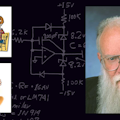After the president of Harvard, Dr. Lawrence Summers, got in hot water for questioning why so many women may not have the aptitudes for science, now it is my turn to put in my two-cents worth. The aptitude of women to be good at science, or engineering, is well documented to be at a lower rate than it is for men. This has been widely published by the Johnson O'Connor Research Foundation (www.jocrf.org), which has been studying aptitudes since 1922.
If you take the top 1/4 of men in this aptitude, many of them are the extremely good scientists and engineers. Then take the top 1/16 of women—they are just as sharp at these physical relationships, which the JOCRF calls "Structural Visualization" (S/V), with a similar distribution of excellent skills. I mentioned this in my column on "Aptitude Stuff" (Electronic Design, Nov. 3, 1997, p. 219). (Also see www.jets.org/latestnews/JOCRF-article.cfm.) Now, not every kind of science or engineering requires this S/V, but many do.
So I tend to support that poor beleaguered man, Dr. Summers. He just happened to have the bad luck to be the president of Harvard while he was telling the truth, or at least asking the right question. Give or take a few percent, I think he is largely right. Some people then bleated, "But there are many women who excellently head science departments at many major universities." One cannot argue against these facts, as they are facts.
But just because a woman is running a science department, it does not necessarily mean she is a great scientist—and it does not mean she is not a great scientist. Rather, it means that she is a good administrator and is good at getting along with the wild-men (and women) scientists. That by itself is an admirable art, and a very good talent, but not necessarily directly related to being good at science. This is sometimes called "herding cats."
It's too darn bad we all have to be so (bloody) politically correct these days. And, it's too darn bad that some people have to be so touchy about situations that have been documented as factual.
Also, note that some studies show that men who are good at engineering and science get those traits from their mothers. It is not yet well stated where the great women scientists get their aptitudes from.
Was my mother very scientific? I don't ever recall debating her on science. But my mother, Beulah K. Pease, was a schoolteacher for over 40 years, and I would say that her common-sense attitudes were never far from science. And I score at the 99th percentile—or higher—on all the S/V aptitude tests. My wife and both sons are very high at this S/V, also.
Meanwhile, all of us who are good at science and engineering should go out of our way to help any kids who are good at science and/or math—or, indeed, whatever they are good at. We really must encourage young people, and especially women and minorities, when they show a spark of brilliance and natural aptitude.
Girls are often discouraged from taking careers in math or science, and we should not let that happen. I can't easily nor seriously encourage (by example) a kid at drawing or music, but I can do something for kids in science or math. Give her (or him) a Heathkit!! (More on this later...)
Do you folks all agree? Or do you think I should apologise (like Dr. Summers) for what I said here? Fat chance!
Comments invited!
[email protected]
or: Mail Stop D2597A, National Semiconductor
PO Box 58090, Santa Clara, CA 95052-8090.
About the Author

Bob Pease
Bob obtained a BSEE from MIT in 1961 and was a staff scientist at National Semiconductor Corp., Santa Clara, CA, for many years. He was a well known and long time contributing editor to Electronic Design.
We also have a number of PDF eBooks by Bob that members can download from the Electronic Design Members Library.